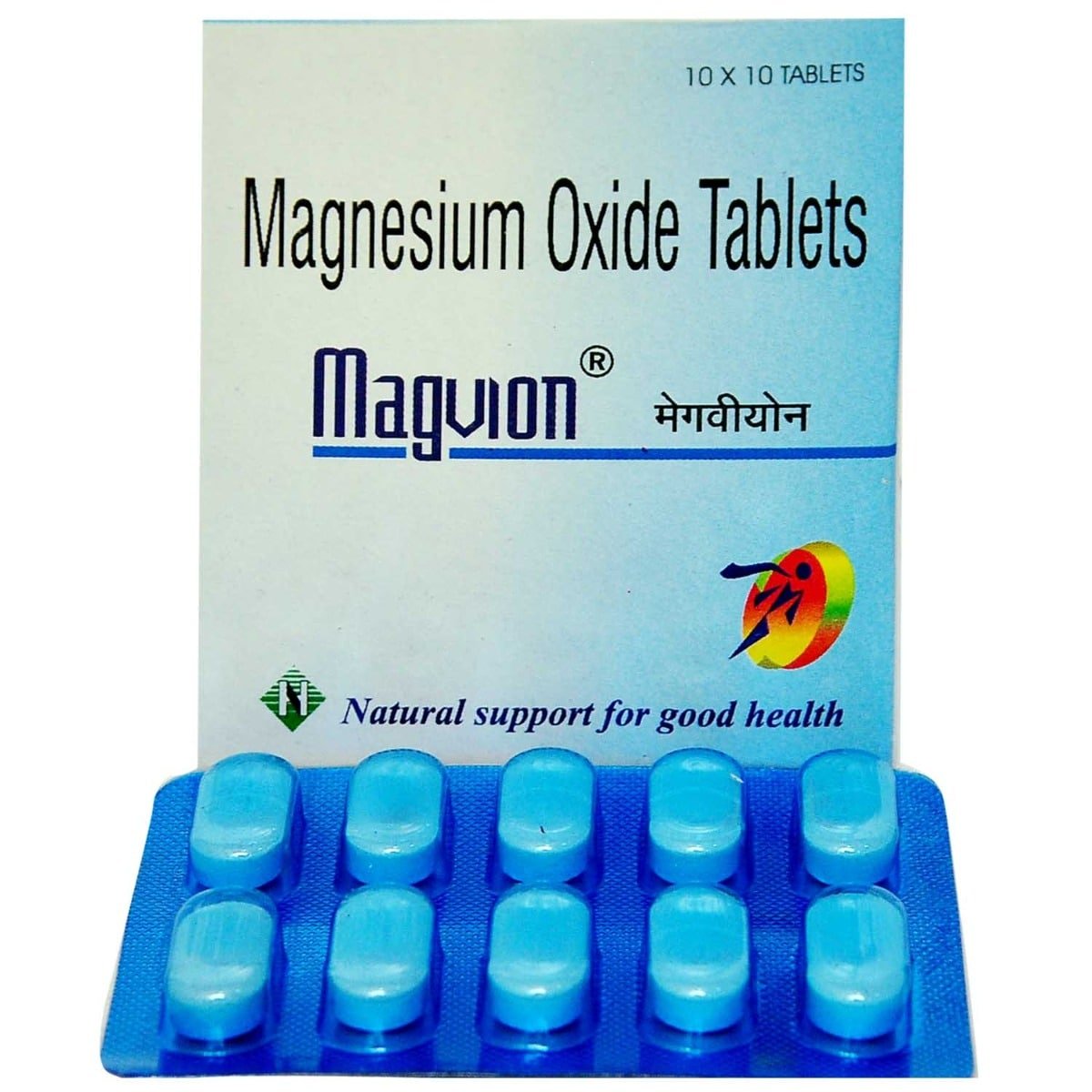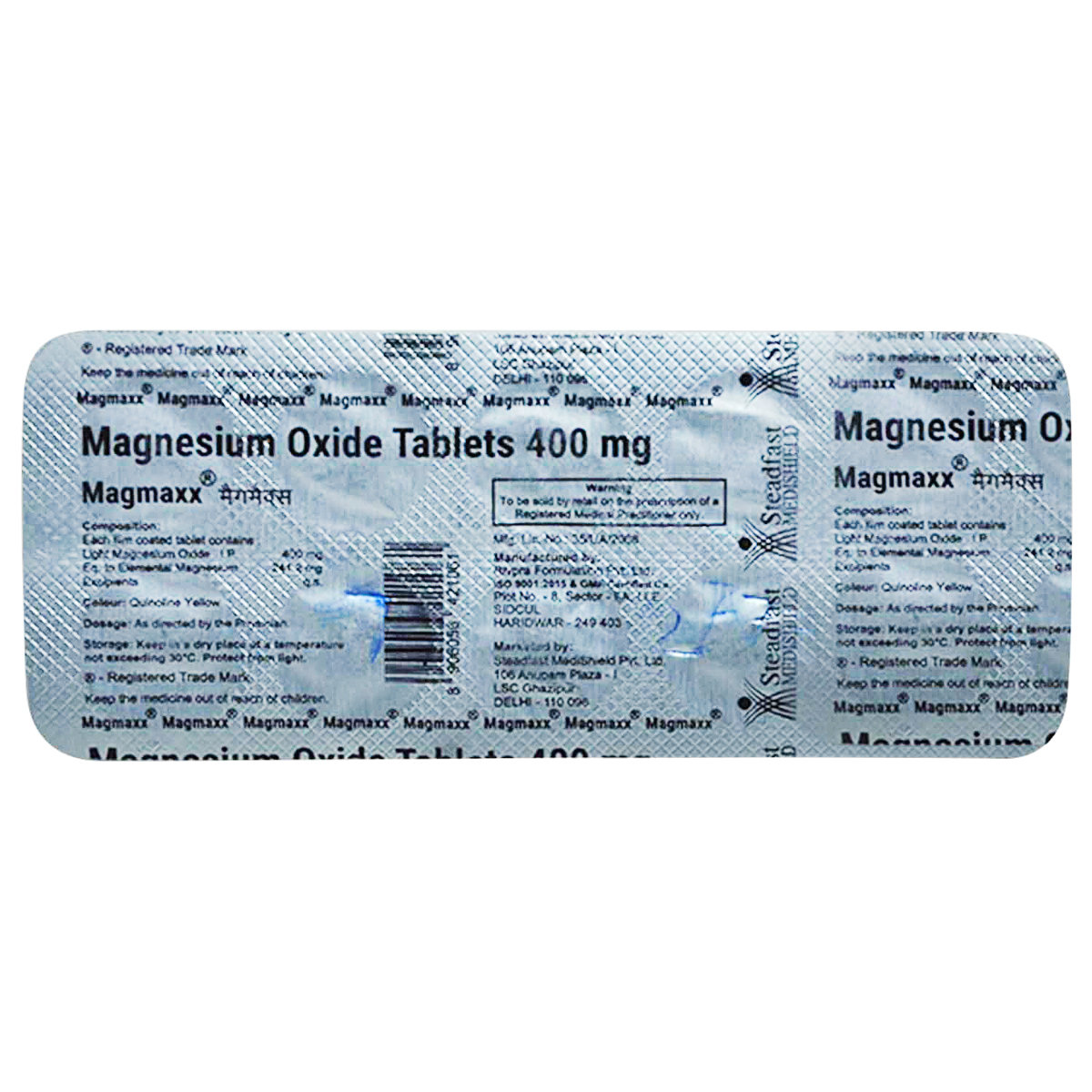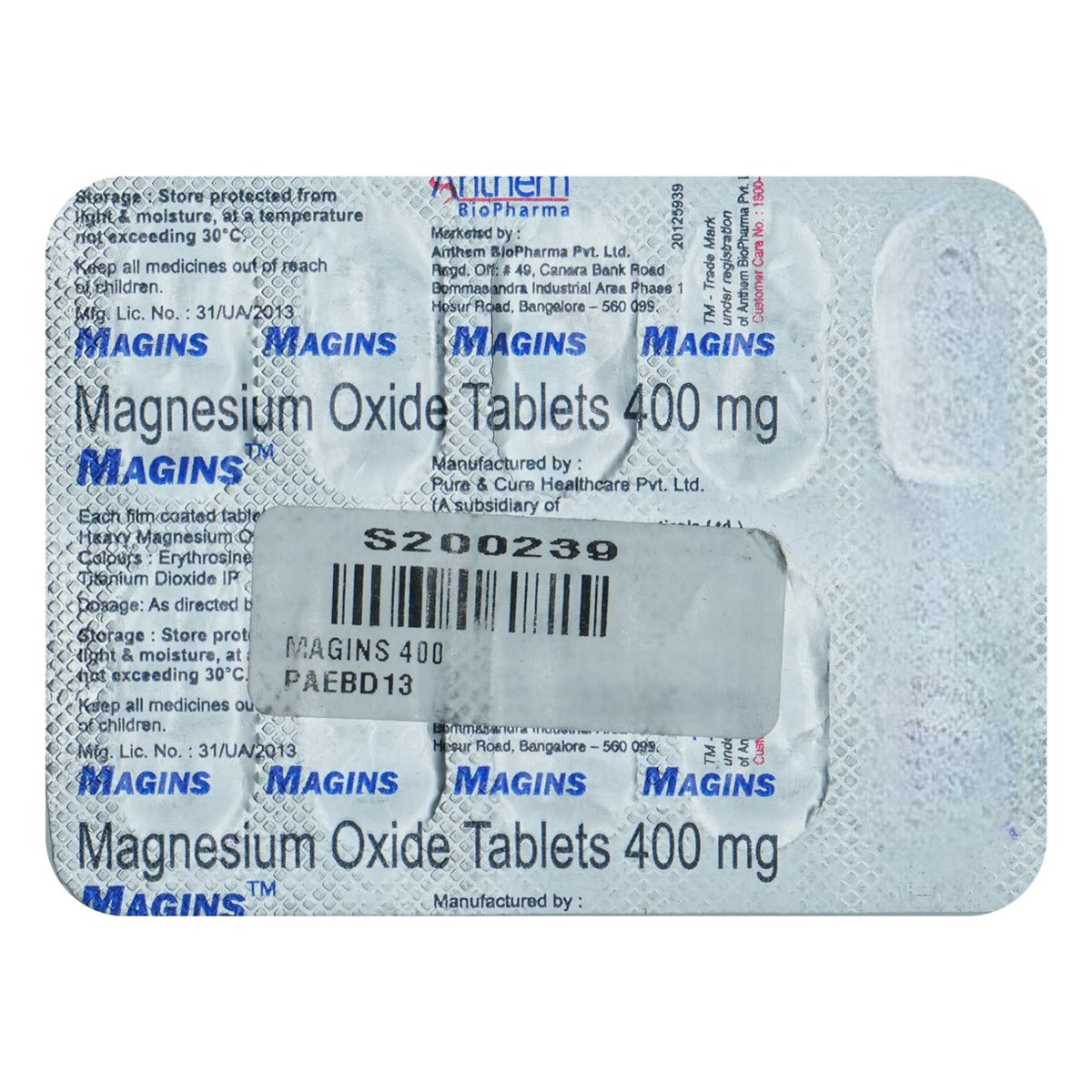Magnesium Oxide
About Magnesium Oxide
Magnesium Oxide belongs to the group of medicines called mineral supplements used to treat acute hypomagnesaemia, a condition characterized by abnormally low magnesium levels in the blood. It also treats stomach upset, heartburn, and acid indigestion. It may also be used for rapid emptying of the bowel before surgery and as a laxative to treat occasional constipation.
Magnesium Oxide contains Magnesium oxide, which is involved in various body processes such as hormone receptor binding, muscular contraction, neuronal activity, neurotransmitter release, and vasomotor tone. It is an alkaliser that neutralises acid in the stomach, thereby treating heartburn, stomach upset, and indigestion. Magnesium oxide treats constipation by drawing water into the intestine and stimulating bowel movement.
Take Magnesium Oxide as recommended. Like all medicines, Magnesium Oxide also causes side effects, although not everybody gets them. Common side effects of Magnesium Oxide include diarrhoea and cramps. Most of these side effects do not require medical attention and will resolve gradually over time. However, if these side effects persist for longer, please seek medical advice.
Do not take Magnesium Oxide if you are allergic to any of its ingredients. If you are pregnant/breastfeeding or have a kidney, heart, or liver problem, please inform your doctor before starting Magnesium Oxide. It is unknown whether Magnesium Oxide alters the ability to drive, so do not drive or operate machinery if you experience any symptoms affecting your ability to concentrate and react. Avoid consuming alcohol along with Magnesium Oxide as it could lead to unpleasant side effects.
Uses of Magnesium Oxide
Medicinal Benefits
Magnesium Oxide belongs to the group of medicines called mineral supplements used to treat acute hypomagnesaemia, a condition characterized by abnormally low magnesium levels in the blood. It is also used to treat stomach upset, heartburn, and acid indigestion. It may also be used for rapid emptying of the bowel before surgery, and as a laxative to treat occasional constipation. Magnesium Oxide is involved in various body processes such as hormone receptor binding, muscular contraction, neuronal activity, neurotransmitter release, and vasomotor tone. It is required for active potassium and calcium transport across the cell membrane. It is an alkaliser that neutralises acid in the stomach, thereby treating heartburn, stomach upset, and indigestion. Magnesium oxide treats constipation by drawing water into the intestine and stimulating bowel movement.
Directions for Use
Storage
Side Effects of Magnesium Oxide
- Diarrhoea
- Cramps
Drug Warnings
Do not take Magnesium Oxide if you are allergic to any of its ingredients. Consult your doctor if you are pregnant or breastfeeding. Inform your doctor if you have intestinal problems, kidney, heart, or liver disease before starting Magnesium Oxide. Because it's unclear whether Magnesium Oxide affects driving abilities, don't drive or operate machinery if you're experiencing any symptoms that make it difficult to concentrate or react. Avoid drinking alcohol while taking Magnesium Oxide because it may cause unpleasant side effects.
Drug Interactions
Drug-Drug Interactions: Magnesium Oxide may interact with medications used to reduce pain, fever, or inflammation (e.g. aspirin), minerals (e.g. calcium/vitamin D), medicines used to treat depression and anxiety (e.g. duloxetine), medicine used to treat and prevent iron deficiency anaemia (e.g. ferrous sulfate), anti-hypertensive medicines (e.g. metoprolol), vitamins (e.g. cholecalciferol), and medicine is used to treat anxiety disorders and panic disorder (e.g. alprazolam).
Drug-Food Interactions: Consuming alcohol along with Magnesium Oxide is not advisable as it may cause unpleasant side effects, or you may become more sensitive to the effects of alcohol.
Drug-Disease Interactions: Inform your doctor if you suffer from renal dysfunction or other medical conditions.
Drug-Drug Interactions Checker List:
Safety Advice

Alcohol
cautionConsuming alcohol with Magnesium Oxide is not advisable as it may cause unpleasant side effects, or you may become more sensitive to the effects of alcohol.

Pregnancy
cautionPlease consult your doctor before taking Magnesium Oxide if you are pregnant or planning to conceive. Magnesium Oxide should be used only if the benefits outweigh the risk in a pregnant woman.

Breast Feeding
cautionMagnesium Oxide is excreted into breast milk when used by a breastfeeding woman. Please consult your doctor before taking Magnesium Oxide if you are breastfeeding.

Driving
cautionIt is not known whether Magnesium Oxide alters the ability to drive, so do not drive or operate machinery if you experience any symptoms that affect your ability to concentrate and react.

Liver
cautionMagnesium Oxide should be used with caution in patients with liver impairment/liver disease. Please consult your doctor. Your doctor will recommend only if the benefits outweigh the risks.

Kidney
cautionMagnesium Oxide should be used with caution in patients with kidney impairment/kidney disease. Please consult your doctor. Your doctor will recommend only if the benefits outweigh the risks.

Children
cautionLimited information is available regarding the usage of Magnesium Oxide in children, so please consult a doctor if you have any concerns.
Habit Forming
Diet & Lifestyle Advise
- Manage your stress, eat well, drink enough of water, exercise regularly, and sleep well.
- Try maintaining a balanced diet, which includes fresh fruits and vegetables.
- Stay hydrated, drink enough water and fluids.
- Exercise regularly, and stay fit.
- Get enough sleep.
- Eat food rich in fibre such as whole-wheat bread, oatmeal, flaxseed, nuts, beans, lentils, fruits (berries, apples, oranges, bananas, pears, figs), and vegetables (broccoli, spinach, sweet potatoes, avocados).
Special Advise
- Your doctor may advise you to get regular blood tests to check the amount of magnesium in your blood.
- Your blood calcium levels need to be regularly monitored while taking Magnesium Oxide.
Patients Concern
Disease/Condition Glossary
Hypomagnesaemia: It is a condition that occurs when a person has abnormally low blood levels of magnesium. This occurs when a person does not get enough magnesium through diet, or he/she is unable to absorb magnesium properly. Symptoms include nausea, vomiting, weakness, personality changes, tremor, fatigue, seizures, irregular heartbeat, and high blood pressure.
Constipation: It refers to infrequent bowel movements in which stools are often dry, painful, and hard to pass. Constipation is a condition in which the person has fewer than three bowel movements in a week. However, bowel patterns may vary from person to person. Symptoms include bloating, abdominal pain, and feeling as if the bowel movement is incomplete.
Acidity: The stomach is usually protected from the acid by a mucous layer. In some cases, due to excess acid production, the mucous layer gets irritated or eroded, which leads to complications like heartburn, stomach upset, and acid indigestion. Symptoms include heartburn, sour or bitter taste in the mouth, and difficulty swallowing.
FAQs
Magnesium Oxide plays a vital role in metabolism. It is involved with hormone receptor binding, muscle contraction, neural activity, neurotransmitter release, vasomotor tone, and cardiac excitability. It is necessary for the active transport of potassium and calcium across the cell membrane.
Continue taking Magnesium Oxide for as long as recommends it. Do not be reluctant to speak with your doctor if you experience any difficulty while taking Magnesium Oxide.
If you have stomach pain, nausea, vomiting, a perforated intestine, a bowel obstruction, severe constipation, colitis (colon inflammation), or toxic megacolon, don't take magnesium oxide for constipation. Also, if you have any rectal bleeding or no bowel movements after using magnesium oxide as a laxative, stop using it right away and seek medical help.
Take Magnesium Oxide only for as long as your doctor has recommended it. If recommended for heartburn/acidity, avoid taking magnesium oxide for longer than two weeks unless advised otherwise by the doctor. If recommended for constipation, avoid taking magnesium oxide for longer than one week unless advised otherwise by the doctor.
Magnesium Oxide may be used for rapid emptying of the bowel before surgery, and as a laxative to treat occasional constipation. It helps treat constipation by drawing water into the intestine and stimulating bowel movement.
Magnesium Oxide can be taken with other medicines if recommended by the doctor. However, maintain a gap of 2 hours between Magnesium Oxide and other medicines.








